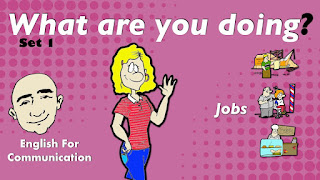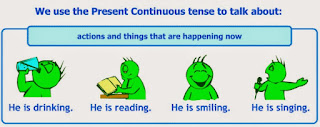What do you like doing ?
Qué che gusta facer ?
Like , love , enjoy : gustar , encantar , disfrutar .
1-First watch this video , then say all the sentences and finally write them on your notebook
-Primeiro mira este vídeo , logo di todas as oracións e finalmente escríbeas no teu caderno.
Remember that " hate" is a very strong verb and you don´t usually use it .You can use "don´t like" instead . Please don´t use "hate"
to talk about people.
- Lembra que odiar é un verbo moi forte e que non se usa habitualmente . Podes usar " non gustar " no seu lugar . Por favor non uses " odiar " para falar sobre persoas.
2-Now watch this video , then write all the sentences on your notebook.
Pay attention ! Some verbs change when -ing is added Examples :
a-When the verb finishes in -e : dance - dancing ,
write- writing.
b-When the verb is short and it is formed with consonant - vowel -consonant : run- running , swim - swimming .
- But other verbs don´t change : eat - eating ,
jump - jumping , fly- flying.
-Agora mira este vídeo , logo escribe todas as oracións no teu caderno.
Presta atención ! Algúns verbos cambian cando engaden -ing Exemplos :
a- Cando o verbo remata en -e .
b- Cando o verbo é curto e está formado por consonante - vogal- consonante .
- Pero outros verbos non cambian .
3- Do this on-line activities . After doing them click on "Finished" and please send them to my E-mail : evamaria.perez@edu.xunta.gal
-Fai estas actividades en liña . Despois de facelas pincha en "Terminado" e por favor enviáas ao meu correo : evamaria.perez@edu.xunta.gal
a- Listen and choose . Escoita e escolle.
b -Writing activities . Actividades de escritura
-First write sentences about other people using the action verbs in the box . - Primeiro escribe oracións sobre outras persoas usando os verbos do recuadro.
Example : He likes playing tennis.
-Then write sentences about you .
- Despois escribe oracións sobre ti.
Example : I like reading books.
4-First listen to this story . Later look up and the new vocabulary in the dictionary and write it on your notebook.
- Primeiro escoita este conto. Despois busca o vocabulario novo no diccionario e escríbeo no teu caderno .
- Now write and answer these questions about the story .
Remember to use full sentences .
Example : A dog is noisier than a ladybug / ladybird .
-Agora escribe e responde etas preguntas sobre o conto . Lembra usar oracións completas .
Exemplo : Un can sé máis ruidoso que unha xoaniña.
a)- What animal is slimier a frog or a cat ?
- A .............. is ............ than a .............
b)- What animal has got longer ears a rabbit or a frog ?
- A ................ has got ............. ears than a ...............
c)-What animal looks wiser an owl or a frog ?
- An ............... looks ................. than a ..................
d) What animal is the fiercest in this story ?
- The ............... is the ................. animal in this story.
e) Why doesn´t the frog like being a frog ?
- The frog doesn´t like being a frog because it is ........................
f) What animals does the wolf loves eating ?
- The wolf .........................................................................
g) Do you like the story ? Why ?
- Yes ,I do / No, I don´t .
- I like the story / I don´t like the story because it is .............. , .............. and ...............
h) Do a comic about the story or write and draw your own story .
What are you doing ?
Qué estás facendo ?
The Present Continuous tense is used to talk or write about things that we are doing now , at the moment we are speaking or writing . Example : I am reading in English right now .
The adverbs we use with the present continuous are : now , right now , at this moment, today .
-O Presente contínuo úsase para falar ou escribir sobre cousas que
estamos facendo agora , no momento en que estamos falando ou
escribindo . Exemplo : Estou lendo en galego xusto
agora.
5-Learn and sing these songs : What are you doing ? and
What is he /she doing ?
-O Presente contínuo úsase para falar ou escribir sobre cousas que estamos facendo agora , no momento en que estamos falando ou escribindo . Exemplo : Estou lendo unha actividade en Inglés xusto agora.
Os adverbios que usamos co Presente contínuo son : agora, xusto agora, neste momento , hoxe.
- Aprende e canta estas cancións : Qué estás facendo ? e
Qué está él / ela facendo ?
6- First say and then write these sentences in Present continuous on your notebook.
-Primeiro di e logo escribe estas oracións en Presente contínuo no teu caderno.
7- Now please do these on-line activities and send them to my e-mail address : evamaria.perez@edu.xunta.gal .
- Agora por favor , fai estas actividades en liña e envías ao meu correo .
a- Watch the video and choose the correct answer.
Alittle help from your teacher : tidy up means ( significa ) limpar , hoovering means aspirando , weird means extraño , can´t stand means non soportan.
- Mira este video e escolle a resposta correcta .
Un pouco de axuda da túa profesora .
b- Match the pictures and the sentences . Write the numbers in the yellow boxes
- Une as imaxes coas oracións . Escribe os números nas caixas amarelas.
c- Listen and write the correct number
( It´s happening while we are talking or writing . The adverbs are : now, right now , at the moment , today ... ) .
Then write the correct number in each box.
- Escolle entre o Presente Simple ( Rutinas e adverbios de frecuencia : sempre , a míudo , a veces ... ) e o Presente contínuo ( Está sucedendo mentras estamos falando ou escribindo. Os adverbios son : agora , xusto agora neste momento, hoxe .... )
Logo escribe o número correcto en cada caixa.












No hay comentarios:
Publicar un comentario